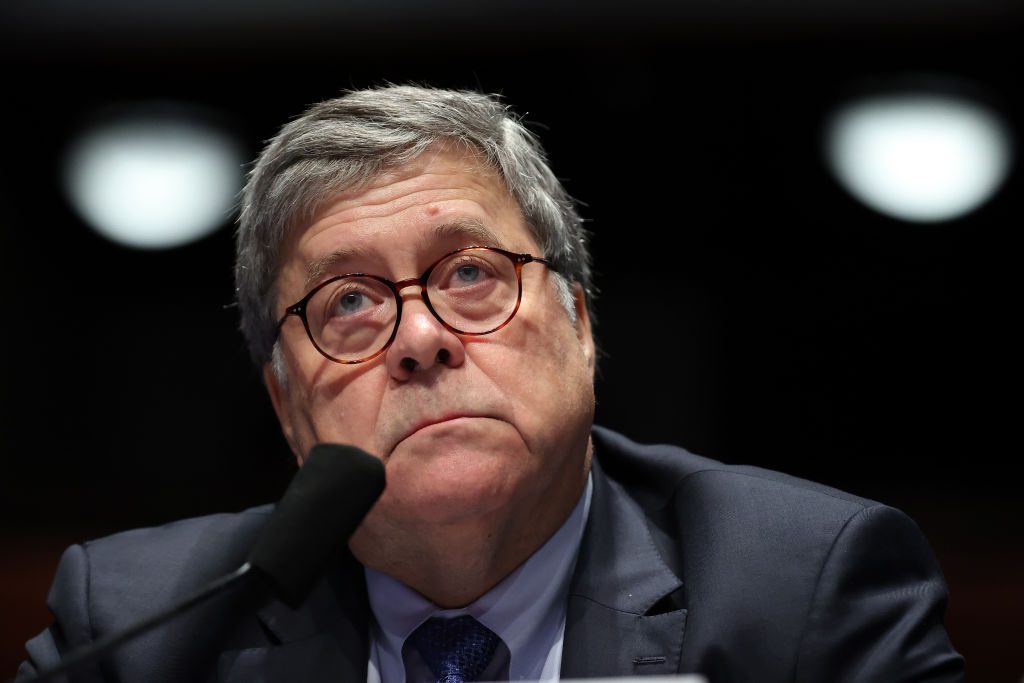William Barr Resigns as Electoral College Names Biden Winner

Attorney General William Barr, who replaced early Trump backer Jeff Sessions midway through the president’s term and cultivated a surprise, archconservative profile himself, will resign next week, the president said on Monday evening.
“Just had a very nice meeting with Attorney General Bill Barr at the White House,” Trump tweeted. “Our relationship has been a very good one, he has done an outstanding job! As per letter, Bill will be leaving just before Christmas to spend the holidays with his family.”
The two sought to maintain a unified front publicly, but it’s clear Barr’s ouster was an effect caused by statements the outgoing attorney general is reported to have made in recent weeks. Barr cast significant doubt on Trump’s attempts to stay in power as merely a “deposed king ranting.” Jeffrey A. Rosen will become the nation’s top prosecutor, on an interim basis.
Ousters of attorneys general have a loaded history in American politics. President Richard Nixon’s firing of Archibald Cox in 1973 is generally seen as a paranoid move that set off a chain reaction that brought a swift and ignominious end to a presidency that had not been without considerable successes.
Barr, in his resignation statement, contended that Trump’s administration was a early victim of an “effort to cripple, if not oust” it “with frenzied and baseless accusations of collusion with Russia,” few of which were ever proved, despite enormous journalistic attention and Special Counsel Robert Mueller’s investigation that subsumed years of Trump’s presidency.
It was always ironic that Barr owed his own ascent, and a career’s revival (he had not served in government since President George H.W. Bush), to the very same investigation. Trump and Sessions’ relationship broke down because Sessions recused himself from the investigation over Russian interference in the 2016 election; Sessions had been a key Trump campaign booster, and he did have limited contact with Russian officials.
But, more recently, it became Barr’s turn in the barrel, as he made plain he was not on board with a final, by all appearances futile, effort by Trump to stay on top.
Prior to the election, Barr, who had served the centrist President Bush as a younger man (then, too, as attorney general) became something of a surprise, folk hero on the right in his curtain call here in Washington. Long a proponent of bellicose executive authority, Barr sought to expand his own portfolio, weighing in explicitly on America’s bitter divides. He disclaimed “militant secularists” that waged a “campaign to destroy the traditional moral order.”
He was denounced by the left.
But Barr’s favor by conservative intellectuals was of little use to Trump as he plotted a renegade endgame.
Trump’s announcement came literally minutes after California voted in the Electoral College, with its 55 electoral votes affirming Joe Biden and Kamala Harris as the victorious ticket in last month’s presidential election. Similar procedures occurred in states around the union on Monday.
Biden’s triumph afforded his status as president-elect a second wave of legitimacy, after most major media, including the center-right stalwarts Fox News and the Wall Street Journal, declared him as such last month. Trump and his allies have suffered a tidal wave of humiliating legal defeats, experiencing no cause for legitimate optimism in their efforts to contest the election with claims of widespread voter fraud.
In theory, the next major event in the saga will occur January 6, when the president of the Senate, Trump’s close ally Vice President Mike Pence, is set to preside over the confirmation of the Electoral College results, as is mandated by the Constitution. But top Trump aide Stephen Miller told Fox on Monday morning that the only date of relevance was the inauguration itself, on Jan. 20, 2021, and that, accordingly, Trump’s team still had “more than enough time” to block Biden from power. Miller said that his contingent is preparing an “alternate” slate of electors that eventually vote to install a second Trump administration come January. Little further elaboration was given.
Relative to many Republican officials, Vice President Pence has been largely mum on Trump’s efforts to contest the election, including Miller’s recent revelation. The vice president has future aspirations for the top job himself, now perilously complicated by Trump’s efforts and the looming prospect of Trump making a comeback bid for president in 2024, or at least keeping that possibility as alive-seeming as possible in accordance with his own interests. Legal scholars have speculated during the course of Trump’s presidency that Trump might suddenly resign in his final hours in Washington, on the condition that a then-President Pence pardon him, alleviating exposure to federal prosecution.
Such fantastic contingencies seemed a little less fanciful than usual Monday night with the sudden termination of a figure once considered Trump’s man, through and through.
Comments